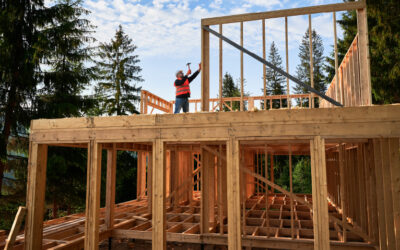Tyler Galaski has been around the construction industry in one way or another for his whole life. He remembers accompanying his father, Dave Galaski, on job sites as a youngster and enjoyed building things in his spare time throughout childhood. Fast-forward to when Tyler decided to make this childhood fascination into an opportunity, launching OTG Construction in the Ottawa, Ontario area in 2009 with the goal of building high-quality homes.
OTG, standing for ‘off the grid,’ began its work in renovations and additions to standing homes, but the objective was always to be able to build new homes from the ground up. In the ensuing eleven years, Galaski’s vision for the company has grown. OTG is now dedicated to building net-zero energy homes for clientele wanting either custom homes or turnkey, predesigned homes and is one of the premier developers of these houses in Canada, performing full construction management from start to finish.
Net-zero buildings are fast becoming more affordable as energy-efficient solutions rise in popularity, but the concept may not yet have become familiar to potential homeowners or industry partners. Put simply, such a house is built to use renewable energy that is stored on-site, so that the house will generate as much energy annually as it consumes.
The approach takes into consideration heating and cooling, hot water, ventilation, and electrical energy systems. Companies like OTG declare that a client can see countless potential benefits ranging from lower utility costs and healthier indoor air quality to superior insulation, a higher resale value, and better overall quality that often exceeds building code standards.
These homes are also a more environmentally sustainable way of approaching home development, as many developers aim to lessen the industry’s dependence on fossil-fuel-based construction and make a positive impact on the world. Galaski has always wanted to prove that building net-zero energy homes is not as hard as people in the industry can make it out to be and that these types of projects can provide both better construction and value for customers in the market.
Within its area of Ontario, OTG distinguishes itself as the only net-zero energy builder. Galaski feels that this type of exclusivity makes transparency, one of the company’s leading values, a necessity in relations within and outside of the industry. Using the example of how, when a custom home is built, the company and its client typically agree on a cost-plus-15 percent price, he believes that being upfront with this figure promotes an honest and healthy working relationship, which is especially important because “trust and transparency are beneficial for all parties involved.”
Galaski and his team are always eager to speak to potential clients about the positives of looking outside the typical home-building process and take all opportunities to help clients understand the homes and answer any questions they may have. Company Administrator Heather Curran notes that communicating the benefits of a net-zero building is a challenge as OTG wants to be able to express these positives objectively and in plain terms so that customers can make the most informed decision possible.
Galaski mentions that the model can also be difficult to pitch to financial institutions like mortgage companies and banks; in Canada especially, net-zero buildings are not valued on the market as highly as they are in the United States, something that he hopes that his company can help to change.
The older generation of builders, general contractors, and companies in the construction industry is still difficult to convince as to the advantages, with some companies simply refusing to even price net-zero homes. Galaski is adamant that proof exists that these buildings work and that builders across Calgary, Alberta, London, Ontario, and southern parts of the province are making them work. He admits that getting the entire industry to accept net-zero building standards will be a struggle but, right now, the younger generation of construction insiders are a bit more open to the idea, so there may yet be large-scale adoption of net-zero development in the future.
Throughout the tumultuous year of 2020, the construction industry saw lowering interest rates amidst the COVID-19 pandemic, which was a signal to Galaski that the real estate market would be a challenging one going forward. After a bit of uncertainty, he feels that the market shake-up was “not the end of anything,” especially when the OTG team rallied to endure the ups and downs of the year.
The current team is a key factor in the company’s success, including people like Site Manager Jeff Beauregard and Construction Hand Allen Hull, as well as Administrator Heather Curran who keeps the company organized and on top of its paperwork. Galaski believes that having a smooth-running, trustworthy team is a business owner’s dream come true, citing his people as “amazing… I’m incredibly thankful for them and how well we work together.” He remarks that it has been a privilege to work alongside this team and his father Dave, who brings over forty years of construction experience which continues to benefit OTG employees and Tyler himself.
Looking ahead to 2021 and beyond, the company will continue building high-quality homes while keeping its trademark transparent relationships with its clients, with a longer-term objective of building a net-zero-energy subdivision in Ontario, and Galaski admits to a degree of excitement for the journey toward this goal. OTG will also be working on expanding its library of turnkey net-zero homes so that clients who are potentially intimidated by the custom-build process may have more options from which to choose in building a home that meets their needs.
Galaski and the OTG team choose not to focus on how others feel about net-zero construction, instead spending time and energy on what can be controlled. They research the science behind it, review the proof, and apply it to create a better final product.













